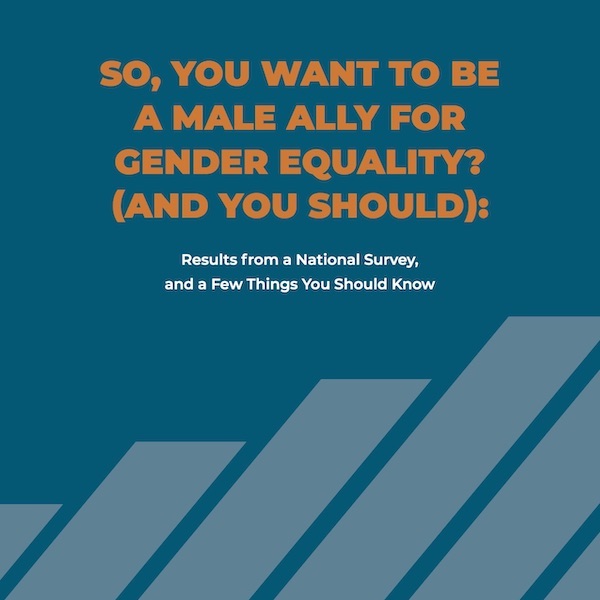Today, on International Women’s Day, Equimundo is launching a national research study on male allyship for gender equality in the US, carried out with support from menswear brand Bonobos. The study’s findings reveal a “male allyship gap” and a pathway forward for men to become better allies and partners with women to achieve gender equality.
The study, So, You Want To Be A Male Ally For Gender Equality? (And You Should), includes results from a nationally representative survey (1,201 adults aged 25 to 45) alongside focus group discussions. It explores women’s and men’s perceptions about gender roles and expectations – at work and at home. The study reveals what actions men are taking to support gender equality and end discrimination and harassment, and it identifies – from women’s perspectives – how men can become better allies and partners in these efforts.
Key findings include:
- Men say they are more aware of and more likely to take action when they see discrimination against women than they were one year ago. In the survey, 48 percent of men report being more aware of the discrimination women face in the workplace than they were one year earlier. Furthermore, they are speaking out: 58 percent of men agree that they are more likely to speak out against sexual harassment now than they were one year ago, and 55 percent of women agree that men they know are more likely to do so.
- Women want concrete action from men, particularly for them to call other men out when they act in sexist or discriminatory ways. Out of 12 possible actions shared in the focus groups for how men can advance gender equality at work, those that women identified as most helpful for men to take on (and that men were most open to taking on themselves) were to: “Let other men know when what they are saying is inappropriate for a work setting,” “Point out when credit for an idea or project is due to your female coworker,” “Openly defend women who are targets of sexual harassment by male associates,” and “Advocate for equal pay.”
- The division of household labor is a source of frustration for many women. Women report wanting more support from their male partners in the form of taking on a greater share of the responsibility for childcare (48 percent of women who are parents) and household chores (58 percent of women living with a male partner), and providing more emotional support (55 percent, same).
- Despite a desire to become better allies for gender equality, many men say that it can be difficult for them to take action: 35 percent of men agree that it’s really hard to step in or speak up when they see someone harassing or bullying someone else. Many are also worried about the potential reaction of work colleagues if they take action (and women agree it can be risky): for example, 47 percent of men and 48 percent of women said men who support women’s leadership often face a lot of criticism.
- The research shows that men may be exaggerating the extent of the action they are taking. While 77 percent of men reported doing “everything they can” to support gender equality at work, only 41 percent of women agreed men are doing so; and 60 percent of women and men agree it’s still rare to see men speak out against discrimination against women.
Most men surveyed are interested in being active allies for gender equality. However, what this allyship looks like – and how far men are willing to go to be allies – remain unanswered. It is concerning that many men overstate their current support as allies for gender equality, suggesting the need for and importance of closing the gap between what men think they’re doing and what women would like for them to do.
The findings provide a roadmap for male allyship. Recommendations for how men can become better allies for gender equality at work and at home include:
- Listen better and seek opportunities to hear women’s stories, acknowledge their experiences, and inform other men.
- Reflect on your own power and privilege as a man and educate yourself on how gender inequality intersects with other identities (like race, sexual orientation, religion, and ability) and forms of oppression.
- Credit ideas to those who came up with them, especially to female coworkers who are often overlooked.
- Advocate for women’s leadership and equality in the workplace and for pay equality by challenging obstacles and stereotypes that limit women’s advancement.
- Speak up when you hear sexist language, and call other men out when they use it.
- Step up at home, and advocate for work-life balance and paid leave for all caregivers.
But individual action alone, is not enough. Real, sustainable change requires men to become full partners and allies in gender equality, and it requires policy and institutional changes. “In a world where women face persistent, structural barriers to equality,” says Gary Barker, President & CEO of Equimundo, “having more men calling out other men for harmful behavior is urgent and necessary, but far from sufficient. We have to realize that without systemic change, we won’t get systemic results.”
Explore the full research findings and road map in So, You Want To Be A Male Ally For Gender Equality? (And You Should).
